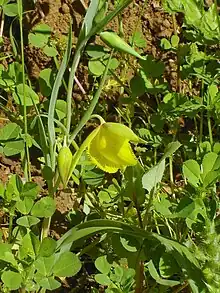| Calochortus pulchellus | |
|---|---|
 | |
| Scientific classification | |
| Kingdom: | Plantae |
| Clade: | Tracheophytes |
| Clade: | Angiosperms |
| Clade: | Monocots |
| Order: | Liliales |
| Family: | Liliaceae |
| Genus: | Calochortus |
| Species: | C. pulchellus |
| Binomial name | |
| Calochortus pulchellus | |
| Synonyms[3] | |
Calochortus pulchellus is a rare species of flowering plant in the lily family known by the common name Mt. Diablo fairy-lantern or Mount Diablo globelily.[3][4]
Calochortus pulchellus is endemic to California, where it is mainly restricted to Mount Diablo of the Diablo Range, in Contra Costa County of the eastern San Francisco Bay Area.[5] There are historical occurrences in the North California Coast Ranges, within Marin, Solano, Napa, and Humboldt Counties.[4]
It grows in chaparral and woodland habitats, currently only known on the bayside−western slopes of Mount Diablo.[5]
Description
Calochortus pulchellus is a perennial herb growing a branching stem up to about 30 centimeters tall. The basal leaf is up to 40 centimeters long and does not wither at flowering; there are 2 or 3 smaller leaves farther up the stem.[5]
The inflorescence is a solitary flower or a cluster of several flowers, which are nodding and usually spherical with all their petal tips touching. The three sepals and three petals are 2 or 3 centimeters long and pale to deep yellow. The petals are thinly hairy inside and often fringed with yellow hairs.[5]
The fruit is a winged capsule 2-3 centimeters in length.[5]
- formerly included[3]
- Calochortus pulchellus var. amabilis, now called Calochortus amabilis
- Calochortus pulchellus var. maculosus, now called Calochortus amabilis
- Calochortus pulchellus var. parviflorus, now called Calochortus monophyllus
References
- ↑ "NatureServe Explorer 2.0".
- ↑ Tropicos search for Calochortus pulchellus
- 1 2 3 Kew World Checklist of Selected Plant Families
- 1 2 Calflora taxon report, University of California.: Calochortus pulchellus Benth. Mount Diablo globelily, Mt. Diablo fairy lantern
- 1 2 3 4 5 Jepson eFlora (TJM2): Calochortus pulchellus
External links
- Calflora Database: Calochortus pulchellus (Mount Diablo globelily, Mt. Diablo fairy lantern)
- Jepson Manual (TJM93) Treatment of Calochortus pulchellus
- United States Department of Agriculture Plants Profile for Calochortus pulchellus (Mt. Diablo fairy-lantern)
- Flora of North America, Calochortus pulchellus
- Contra Costa County Report: Mt. Diablo fairy-lantern
- U.C. Calphotos gallery of Calochortus pulchellus
